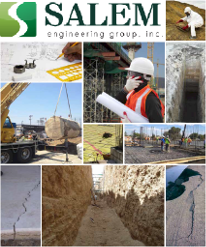“Our team of geologists, engineering geologists, and hydrogeologists are ready to assist you with your site development needs. SALEM Engineering Group, Inc. has broad and localized experience in assisting owners, developers, architects, engineers, and governmental agencies in applying value-based geologic engineering and hydrogeologic services to their varied projects.”
The western United States represents a complex geologic and seismic environment, and site development projects located in this region are often faced with challenging conditions. SALEM Engineering Group, Inc. understands that these potential issues require the coordinated effort of experienced geologists and hydrogeologists to provide value-oriented solutions. Our team of experienced staff are able to successfully tackle the various geologic hazards and unique groundwater conditions that may affect your property/project including fault rupture hazard investigation, liquefaction evaluation, slope stability issues, probabilistic and deterministic seismic risk, shallow groundwater, rippability assessment, mining reclamation, forensic studies, construction dewatering, aquifer testing, and infiltration basin design.

Download SOQ
Geologic/Seismic Hazard Assessment
A Geologic/Seismic Hazard Assessment addresses the hazards inherent to a site as a result of the interaction of site development and the surrounding geologic and seismic environment. The primary hazard posed by earthquakes is the potential for ground rupture to directly affect structures. Earthquakes also often result in secondary hazards that may cause widespread damage. The three most likely secondary earthquake hazards are ground-shaking, liquefaction/lateral spreading, and landslides or rockfalls. Other seismic hazards may include the seismic settlement of unsaturated soils, flooding associated with dam failure and inundation, tsunamis and seiches. Non-seismic geologic hazards include those posed by the presence of shrinking/swelling soils, soils with a high collapse potential upon wetting, local and regional ground subsidence generally due to groundwater extraction, and soils that represent long-term settlement issues such as Bay Muds.
Liquefaction Analysis
Larger seismic events can produce significant and sometimes catastrophic total and differential settlement of structures as a result of the liquefaction of low-density silty and sandy soils, whereby the soil temporarily loses its strength characteristics due to a pore-water pressure increase caused by the passing seismic waves. Liquefaction effects are generally limited to the upper approximately 50 feet of the soil profile, and there, only in saturated or nearly-saturated soils. SALEM Engineering Group, Inc. commonly evaluates liquefaction potential within State-designated Liquefaction Hazard Zones, or where low density soils and shallow groundwater coexist, using subsurface data generated by hollow stem auger drilling and SPT-sampling, or using Cone Penetrometer Test (CPT) methods. Based on this analysis, SALEM Engineering Group, Inc. can recommend settlement mitigation techniques for structures that may include ground improvement or enhanced foundation design.
Site-Specific Ground Motion Hazard Analysis
As required by California regulations, a Site-Specific Ground Motion Hazard Analysis must be conducted for public school, hospital, and essential services buildings if an applicable Seismic Design Category has been established for the site. This analysis determines both probabilistic and deterministic-based ground motions and combines these data to generate a site-specific site response spectra used by structural engineers for building design.
Fault Rupture Hazard Investigations
The State of California has established Earthquake Fault Zones (formerly known and commonly referred to as an Alquist-Priolo Earthquake Fault Zones [A-P zones]) in many areas of the state along faults it considers as active. State and County governments require that a fault rupture hazard investigation study be conducted for plan approval of any habitable structures proposed to be located within an A-P zone. Subsurface exploration by trenching and trench wall logging is generally required to assess the potential of active faulting within these sites. Trenching investigations may be amended, or wholly replaced, using continuous core drilling and logging and/or Cone Penetrometer Test (CPT) holes where access difficulty makes trenching infeasible. Surface-only (indirect) investigations may include geophysical methods such as seismic refraction or electrical resistivity surveys.
Slope Stability Assessment
Many areas of California lie within State-designated Landslide Hazard Zones, which include much of the hilly terrain in Southern California and the Coastal Ranges underlain by relatively young, weak bedrock. Development planned for the toe and crest areas of slopes in these regions, and in other sloping terrain, has the potential to be affected by slope movement and, in fact, the development could potentially adversely affect that movement potential. SALEM Engineering Group, Inc. can conduct a stability assessment that includes site reconnaissance and geologic mapping by an Engineering Geologist, and soil/rock sample collection and testing. This information is then used to generate geologic maps and cross sections and to conduct slope stability analysis using computer software. Based on the analysis, SALEM Engineering Group, Inc. may recommend project modifications that could include building siting revisions, deep foundations, or slope modification including reinforcement or reconfiguration.
Landslide Investigation and Mitigation Design
Many areas in hilly terrain have been affected by previous landslides and slope movement. SALEM Engineering Group, Inc. can develop slope investigation and monitoring programs to better understand the extent and magnitude of movement. The programs may include detailed geologic mapping, drilling and soil sampling, down-hole geologic mapping in large-diameter boreholes to better identify the slide plane upon which movement has occurred, and installation of slope movement monitoring instruments such as inclinometers. Compilation and analysis of data generated by the program may then be used to design slope instability mitigation measures that either increase the resisting forces or decrease the driving forces causing slope movement. Such measures may include slope reconfiguration, soil or rock buttresses, installation of shear pins or tie-backs, or a combination of methods as determined by the site restrictions, slope conditions, and budget.
Rock Rippability Studies
Many development projects in weathered bedrock terrain will encounter resistant bedrock exposures at or near the surface, or within planned grading depths. To limit the potential for project scheduling delays, it is critical that the equipment adequate to move these materials be available during grading. More importantly, the need to mobilize specialty equipment or use enhanced methods (blasting, etc.) to attain rough site grade can substantially increase a project’s overall budget. During the site development planning stage, SALEM Engineering Group, Inc. can provide geophysical services (usually seismic refraction surveys) to determine the seismic velocity profile across a site, which may then be correlated to the capability to rip geologic material using large tracked vehicles equipped with a ripping shank.
Surface Mining Resource and Reclamation
SALEM Engineering Group, Inc. can develop a resource assessment plan for new or expanding sand and gravel extraction areas. Plan research may include obtaining data from existing or nearby operations, geologic reconnaissance, review of aerial photograph/satellite imagery, surface geophysical methods, and subsurface exploration programs including drilling using sonic or Becker-hammer drilling methods. Former quarry operations often create extensive volumes of non-engineered backfill that may negatively impact the re-use potential of the operation area for building sites due to long-term and differential settlement issues. SALEM Engineering Group, Inc. can assist in establishing settlement monitoring and pit reclamation geotechnical criteria that may enable future construction over the former quarry areas with limited restrictions on structural or foundation design.
Related Services

Geotechnical Engineering
SALEM Engineering Group, Inc. offers a wide range of geotechnical …

Hydrogeology
The western United States represents a complex geologic and seismic …

Forensic Engineering
SALEM has a professional relationship with several national insurance …
Drilling
“Our Mission is to develop long-term relationships by providing …

